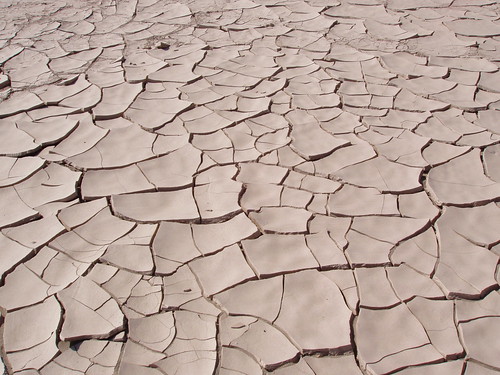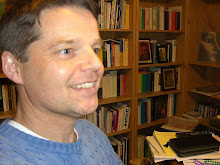 The driest place on earth, according to climatologists, is the Atacama desert in the north of Chile. There are sterile, intimidating stretches where rain has never been recorded, at least as long as humans have measured it. You won’t see a blade of grass or cactus stump, not a lizard, not a gnat. The air is so dry, it literally sucks the moisture out of your finger nails and turns them brittle as autumns leaves.
The driest place on earth, according to climatologists, is the Atacama desert in the north of Chile. There are sterile, intimidating stretches where rain has never been recorded, at least as long as humans have measured it. You won’t see a blade of grass or cactus stump, not a lizard, not a gnat. The air is so dry, it literally sucks the moisture out of your finger nails and turns them brittle as autumns leaves.It is dry in the Atacama, but it’s not the driest place on earth. The driest place is where hope has evaporated:
The driest place is the desolate land between Israeli cities and settlements and Palestinian villages and refugee camps where every peace initiative seems destined to fail.
The driest place is among the walls of destroyed schools in Pakistan’s Swat valley, where the Taliban have ruled that educating girls is against God’s will.
The driest place is in a little suburban house somewhere in the U.S. where a young man has to decide whether it’s OK to stay in college after both his parents lost their jobs.
The driest place on earth is the place where all roads come to an end and you know you can’t stay there, but you can’t see a way out either. The driest place is the place where all hope has evaporated and nothing moves.
Ezekiel has seen this place; it is a valley full of bones. He didn’t want to see it. He didn’t go there out of curiosity. It was the Lord who set him down in the middle of the valley. It was the Lord who led him all around so he would get a good look. There were very many bones, and they were very dry.
When I was little, I hid behind the couch when a tv program got to scary for me. And I still close my eyes sometimes when I don’t want to see what I’m afraid I’m about to see.
When I was little, and I didn’t want to hear what I was being told, I put my hands over my ears and started chanting, “I can’t hear you – I can’t hear you – I can’t hear…” and I still pretend I can’t hear sometimes when I don’t want to hear what I’m afraid I’m about to hear.
When I was little, I ran up the stairs from the dark basement to the kitchen where my mom was, and she thought it was all youthful energy, but I knew it was fear of the dark. And I still want to turn around and run sometimes. Instinctively I reach for the remote to change the channel from disturbing and unsettling to distracting and entertaining. I don’t want to be in the driest place; I’m afraid it will suck me dry. Give me a story that puts hands over my ears and eyes.
Ezekiel stayed; he stayed, with open eyes and ears, and the Lord asked him, “Mortal, can these bones live?” Now he could have responded, “No, Lord, this is where all roads come to an end, and the only thing awaiting these bones is to be turned into dust.” Or he could have given the perfect Sunday school answer, “Yes, Lord, these bones can live, for with you all things are possible,” and turned around and gone home.
But Ezekiel stayed and replied, “O Lord God, you know.” You must decide whether you want to hear that as a statement of profound confidence in God or as a challenge – something like, “You’re asking me, if these bones can live? What do you say?”
And the Lord said to him, “Prophesy to these bones, and say to them: O dry bones, hear the word of the Lord.”
Ezekiel didn’t go to the driest place by choice, but when the Lord set him down in the middle of it, he stayed long enough to see, long enough to hear the question, long enough to hear the call, “Speak to these bones.” He stayed long enough to hear the word of life, “Thus says the Lord God, I will cause breath to enter you, and you shall live; and you shall know that I am the Lord.”
And Ezekiel’s tongue may have been brittle as a leaf in the fall, but he spoke as he had been commanded, and as he spoke, the bones became bodies, and the bodies a people, and the breath came into them, and they lived, and stood on their feet, a vast multitude.
The Spirit of God came with the words of the prophet who stayed long enough to see and hear and obey. And in the driest place on earth, the words of the prophet are like rain in the Atacama.
On Pentecost, the church celebrates the outpouring of God’s Spirit on the disciples. In the Fourth Gospel, Jesus is particularly concerned to prepare his followers for the time after his death and return to God.
“I will not leave you orphaned,” he promises them, preparing them for the reality of feeling abandoned like motherless children.
“Love one another as I have loved you,” he commands them, again preparing them for the time when he would no longer be physically available to them.
“Abide in me as I abide in you,” he urges them, leaving them wondering how he would abide and go away, be present and absent at the same time.
Three times Jesus speaks of someone who would come from God to be with them. In our Bible translations we call him the Advocate, the Counselor, the Helper, or the Comforter; the greek word refers to someone called to the side of another to help.
Jesus says, “I will ask the Father, and he will give you another Advocate to be with you forever.”
“The Advocate, the Holy Spirit, whom the Father will send in my name, will teach you everything, and remind you of all that I have said to you.”
“When the Advocate comes, whom I will send to you from the Father, the Spirit of truth who comes from the Father, he will testify on my behalf.”
Having seen the glory of God in Jesus, the disciples would not face the world alone, but testify together with the Spirit to the grace and truth in Jesus Christ. Having heard the words of eternal life from Jesus, they would not face the future alone. The Holy Spirit would proclaim the teachings of Jesus to them in the new and changing circumstances of their lives. Jesus’ revelation of God would not be limited to the first generation of believers to whom Jesus was visible in the flesh and tangible; his ministry would continue in the ministry and witness of the disciples and the Spirit. The work of the Advocate is to make Jesus present, to mediate fresh encounters with his words of eternal life, given at the time of need. And in the driest place the need is great.
On Pentecost, the church celebrates the outpouring of God’s Spirit on the disciples. The Advocate did not remain a kind promise to the confused and frightened followers of Jesus. The Holy Spirit came – and continues to come – to inspire, empower, and teach the church to act with love and speak with boldness. It is through the Spirit that Christ abides in us and we in him.
According to John, the Holy Spirit is not busy bestowing particular gifts on individual believers, nor is the Spirit’s presence discernible as an internal experience of the individual believer or an outward display of spectacular spirituality. The Holy Spirit is given to the community for the life of the community, and the community’s calling is to be in the world as witnesses, as those who love as we have been loved, and proclaim as we have been commanded.
The Holy Spirit is given to us so we can be in the driest places where hope has evaporated and nothing moves, and not turn away, not run away, but abide with those for whom going away is not an option. The Holy Spirit is given to us so we can be there long enough to see, long enough to notice the great silence behind the world’s chatter, long enough to hear the question God is asking, long enough to hear the word of life, long enough to speak it. The Holy Spirit is given to us so we can hear and proclaim Jesus’ words of eternal life, words that comfort and challenge, words that guide, illumine, teach, convict, and liberate.
Very few of us can be in the parched place where Palestinians and Israelis no longer live as neighbors but as enemies. And very few of us can be in the parched place where the education of girls or the participation of women in public life are forbidden in the name of God. But we can listen to their stories with hearts strengthened by the Spirit, hearts ready to hear and respond.
And we can be in the driest place where families struggle with making ends meet, where co-workers go through trying times without a friend, and where fear is creeping in from all sides.
We can be there. It may be hard to stay, to see and hear and understand what’s really going on. It may be hard to bear the burden of knowing without seeking easy answers that are almost always too easy.
It may be hard, but the Advocate is given to us so we can continue to live as witnesses of our risen Lord even in the driest place.
The Advocate is given to us so we too can be advocates, comforters, helpers, vessels of God’s refreshing and renewing love.
Audio of this post.




No comments:
Post a Comment